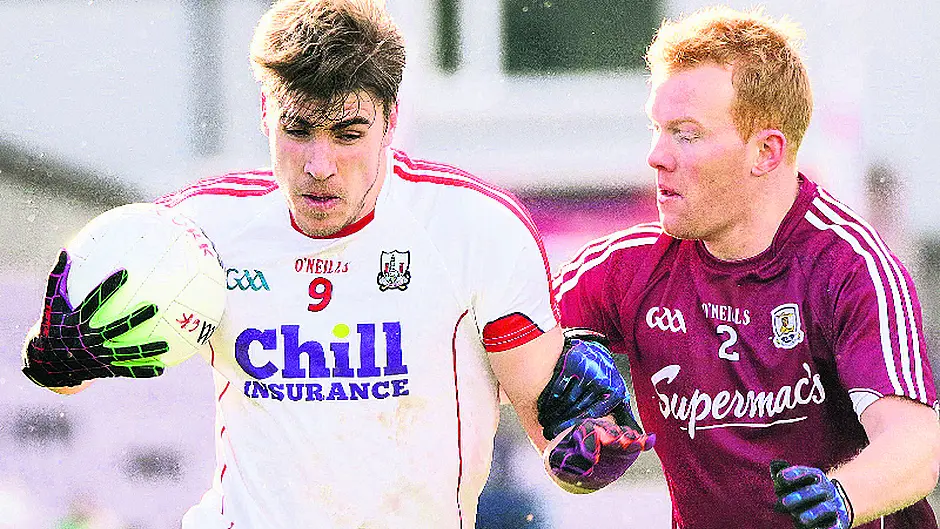Armed with an Excel spreadsheet and a thirst for stats, DENIS HURLEY examines how many players Cork manager Peadar Healy has used since he took charge
Armed with an Excel spreadsheet and a thirst for stats, DENIS HURLEY examines how many players Cork manager Peadar Healy has used since he took charge
THE disappointing loss to Kildare in Division 2 of the Allianz FL a fortnight ago was Peadar Healy’s 18th in charge of Cork across McGrath Cup, league and Munster and All-Ireland championship.
Would you care to guess how many players have featured for the county in that time? We asked the sports editor, giving him a margin of error of five either side. He suggested 43, feeling that the McGrath Cup pre-season competition would inflate the figure somewhat. He was right on that front, but was still 20 short. Yes, 20.
Beginning with Healy’s first game in charge, against Limerick in Mallow on January 3rd, 2016 – a 1-10 to 0-12 win – a total of 63 players have taken to the field for Cork, an average of three and a half new additions per game (the cruel among you may say that having half a player could account for some of Cork’s poor results in that time).
One player has been selected to start all 18 games – the answer of that one is in the panel attached, to give you time to consider it.
Of those to feature in 2016, only Shane Beston – a starter in that Limerick game – and Alan Cadogan – who was on secondment from the county hurling panel, were the only true ‘one-hit wonders’, though there have been nine players to start just one game. Perhaps more pertinently, 11 of the 63 featured in just two games, including goalkeepers Brendan O’Connell and Micheál Martin.
O’Connell, a former Republic of Ireland international goalkeeper at amateur level, was cut loose after a disappointing performance against Donegal in last year’s league. While Martin was the back-up to Ryan Price after the O’Donovan Rossa man became the first choice last year, he was jettisoned this year following the return of Ken O’Halloran to the fold.
Perhaps surprisingly, the total number of players at the end of last year’s league campaign – which saw Cork relegated, albeit unluckily after finishing level on six points with three other teams – stood at 38.
By that stage, Colm O’Driscoll and Ian Maguire had both played ten games, Tomás Clancy (Fermoy) nine and Brian and Kevin O’Driscoll eight each, Brian with eight in a row – all in the half-back line – after missing the first two McGrath Cup games.
Twelve players who played in the championship for Cork didn’t play in the McGrath Cup or league at all – Noel Galvin, Tom Clancy (Clonakilty), Conor Dorman and Alan O’Connor exclusively as starters, Seán Powter, John O’Rourke and Stephen Cronin starting and off the bench, and Seán White, the now-retired Patrick Kelly, Aidan Walsh and Alan Cadogan only as subs, the latter two after the hurlers’ own disappointing exit.
With such a large contingent of players used, it’s hardly surprising to learn that, like Claudio Ranieri at Chelsea or Rafael Benitez at Liverpool, unchanged teams were an endangered species.
The closest Cork got in 2016 was after the league loss to Dublin in Croke Park, when 14 of that side started the home win over Monaghan – the only switch was Price coming in for his debut in place of Martin, and that was only before throw-in, with the Skibb netminder actually wearing number 16.
The corollary of that is that five players had been dropped for the Dublin game following the heavy defeat to Roscommon just beforehand – Daniel Goulding’s only other start for Cork was against Longford in the summer, Andrew O’Sullivan departed the panel soon after and O’Halloran and Michael Shields followed, though both have returned and featured in the McGrath Cup.
Come the summer, there were just two switches between the Limerick and Longford wins – Goulding for Colm O’Neill and Michael Hurley for Luke Connolly.
That Limerick game had seen four changes following Cork’s first loss to Tipperary in the championship since 1944 and none of the players who missed out – Seán Kiely, Conor Dorman, John O’Rourke and Brian Hurley – started again in 2016, though one would presume that Hurley would have but for a nasty hamstring injury, from which he is only now recovering.
The O’Driscoll brothers proved to be among the most versatile. Colm played in both corner-back positions, both wing-forward spots and right half-back, Kevin played at 5, 6, 7, 10 and 12, while Brian was all across the half-back line (and played at half-forward in this year’s McGrath Cup).
Tomás Clancy matched Brian O’Driscoll’s range but in attack there wasn’t as much variation – only captain Paul Kerrigan started in three positions (right half-forward, centre-forward and left corner-forward).
Of course, no management team sets out to make widespread changes just for the sake of it, and if the squad had been more stable (something of an impossibility in any case, given the injuries suffered), there would have been accusations of not spreading the net wide enough.
Prior to the start of the league, Cork selector Eoin O’Neill expressed the hope that a greater consistency of selection would lead to greater consistency in terms of results and it must be noted that there was just one change for the Kildare game after the draw with Galway, Colm O’Neill replacing Niall Coakley – the former Carrigaline man, now with St Jude’s in Dublin, is among 12 of the 63 to have been newly added this year.
Unfortunately for Cork, keeping faith with the majority didn’t bring its rewards as Kildare took victory by six points – and should probably have won by more.
The question now is to what extent alterations should be made for Sunday’s visit of Fermanagh to Páirc Uí Rinn. The general perception might be that the Ernesiders are weaker and therefore it’s a chance to rotate, but the reality is that they have two points to Cork’s one and a victory is essential.
If the side which faced Kildare was close to being the ‘first team’, such as it could exist, should the players be retained in order to help them gel further? We can only wait and see, and perhaps revisit the situation after the league.










